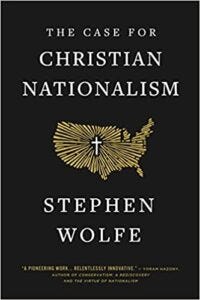Who’s Afraid of Christian Nationalism?
Those who claim this label aren’t trying to turn the U.S. into a theocracy
By Mark David Hall
Since 2006, journalists, activists and academics have produced a steady stream of books and articles warning of the dangers of Christian nationalism, which has been defined as “an ideology that idealizes and advocates a fusion of American civic life with a particular type of Christian identity and culture”—specifically, one that “includes assumptions of nativism, white supremacy, patriarchy and heteronormativity, along with divine sanction for authoritarian control and militarism.”
Two dozen books have been written warning against Christian nationalism, but no book advocated for it until fall 2022, when Andrew Torba and Andrew Isker self-published “Christian Nationalism: A Biblical Guide to Taking Dominion and Discipling Nations.” This slim volume was endorsed by Douglas Wilson, the provocative pastor of Christ Church in Moscow, Idaho. Wilson has a small but intense following among some Calvinists and is a master institution builder, as discussed below.
Wilson has also endorsed Stephen Wolfe’s “The Case for Christian Nationalism,” published in 2022 by Canon Press, which Wilson helped found. Wilson has argued that the concept of Christian nationalism is “salvageable.” He offers tepid support for it in “Mere Christendom” (2023), also published by Canon Press.
One might expect books advocating for Christian nationalism to offer a road map showing how the United States may be taken back for Christ. Instead, these books are best characterized as instruction manuals to help Christians live in a post-Christian country. In other words, they more closely resemble calls for a Protestant Benedict Option, wherein Christians retreat from mainstream society into small, self-sufficient enclaves, than calls for the creation of a repressive, Atwoodian Republic of Gilead.
What’s a Nation?
It is especially ironic in light of the cover of Wolfe’s book that none of these authors is particularly interested in the United States of America or in nationalism, at least as nationalism is usually understood. For instance, Wolfe writes that “the United States as a whole, is lost” (emphasis original). According to him, the best we can hope for is that “there is at least one Christian nation in America.” He contends that this “nation,” which exists within the boundaries of the United States, could “will” itself into existence, but he gives very little guidance about how this might be accomplished.
Similarly, Torba and Isker are far more concerned with states than with the nation. When they do discuss the United States, they make it clear that they “do not idolize or worship our nation,” do not believe that “America was ‘uniquely chosen by God’ as a ‘Promised Land’” and do not view “America as some uniquely chosen nation.”
Wilson asserts that the United States was at one point a Christian nation, but he is more interested in local political communities than in America. And he makes it crystal clear that he believes it is idolatry to conflate God and country.
The Vision
Stephen Wolfe notes that his book is not an “action plan” for creating a Christian nation, but this doesn’t mean it lacks practical advice. He concludes his work by encouraging “Christian households in America [to] form local networks of production and exchange,” husbands to “lead the family in family worship” and pastors to focus on the church rather than on politics. He is highly critical of contemporary culture and encourages his audience to read old books and to maintain the “timeless wisdom, prudence, and knowledge of our Western heritage.”
In Wolfe’s vision, a man will “lift weights, eat right, and lose the dad bod,” and a woman will make “food from scratch from her own garden.” The “most committed Christian nationalists [will be] farmers, homesteaders, and ranchers,” Wolfe contends. This is not the agenda of a frightening nationalist. It would be more accurate to consider Wolfe the Wendell Berry of Christian localism.

Similarly, Torba and Isker do not offer a plan for taking over America for Christ. Indeed, they are almost totally uninterested in what governing institutions or laws should look like. Instead, much of their book is dedicated to exhorting Christian men to build “a parallel Christian society,” to “boldly share the Good News, the gospel of Jesus Christ,” to “establish nuclear families” and to “build sovereign businesses.”
Education, rather than politics and law, is key for success: “Our sons will have been through the Classics, all of Greek Philosophy, the entire Bible, and know how to build things with their hands, shoot guns, grow food, hunt, fish, lift weights, and start a business by the time they are 18.” By way of contrast, “The world’s sons will be demoralized for 18 years in the demonic schools, propagandized by the enemy’s entertainment and ‘news’ media, then sink into a mountain of debt slavery to be intellectually castrated by some marxist college.”
Parallel Societies
Torba, Isker and Wolfe encourage the formation of parallel Christian societies, an activity with which Wilson has extensive experience. He has helped found a prominent classical and Christian school (Logos School in Moscow, Idaho), a national organization to support such schools (the Association of Classical Christian Schools), a Christian denomination (Communion of Reformed Evangelical Churches), a publishing company (Canon Press), a seminary (Greyfriars Hall, also in Moscow) and a college (New Saint Andrews, also in Moscow).
Wilson is sometimes accused of desiring to take over Moscow, Idaho, a town of 22,000, but by most accounts no more than 10% of the town’s population is sympathetic to his project. It is fair to say that he would like Moscow to become a Christian community, but he has stated multiple times that “Christian republics and commonwealths are formed by preaching, baptizing, and discipleship, and not by campaigning, legislating, pundit-blogging, and so on. This gospel work will have political results, but it is not politically established.”
Are Christian Nationalists Dangerous?
Critics of Christian nationalism have long warned that “the ultimate goal of Christian nationalist leaders isn’t fairness. It’s dominion. The movement is built on a theology that asserts the Christian right to rule.” Such Christian nationalist leaders might exist, although I suspect it is possible to count on one hand (perhaps one finger) those identifying themselves as Christian nationalists who hold national political offices. None of the authors discussed in this essay offer any hope that political action can make the United States Christian again.
The fact that these books don’t advocate for serious political action doesn’t mean they shouldn’t be criticized. In fact, all these authors have idiosyncratic religious views that lead them to embrace positions rejected by many practicing, orthodox Christians (including me). Nevertheless, serious consideration of these works should calm critics who believe that Christian nationalists are actively seeking to turn the United States of America into a fascist theocracy. Indeed, if all they want is to retreat from U.S. society and politics, maybe we should just . . . let them.





